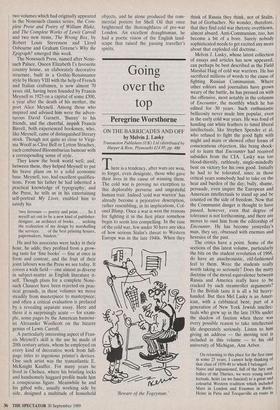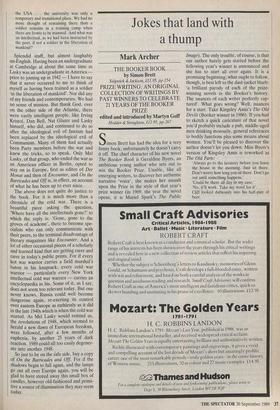Going over the top
Peregrine Worsthorne
ON THE BARRICADES AND OFF by Melvin J. Lasky
Transaction Publishers (UK) Ltd (distributed by Harper & Row, Plymouth) £14.95, pp. 480
There is a tendency, after wars are won, to forget, even denigrate, those who gave their lives in the cause of winning them. The cold war is proving no exception to this deplorably perverse and ungrateful human trait. Indeed 'cold war warrior' has already become a pejorative description, rather resembling, in its implications, Col- onel Blimp. Once a war is won the reasons for fighting it in the first place somehow begin to seem less compelling. In the case of the cold war, few under 50 have any idea of how serious Stalin's threat to Western Europe was in the late 1940s. When they `Beware of the Fogeyman.' think of Russia they think, not of Stalin, but of Gorbachev. No wonder, therefore, that they find cold war rhetoric overblown, almost absurd. Anti-Communism, too, has become a bit of a bore. Surely nobody sophisticated needs to get excited any more about that exploded old doctrine.
Melvin J. Lasky, whose latest collection of essays and articles has now appeared, can perhaps be best described as the Field Marshal Haig of cold war warriors. He has sacrificed millions of words to the cause of fighting Russian Communism. Where other editors and journalists have grown weary of the battle, he has pressed on with the offensive, most notably in the columns of Encounter, the monthly which he has edited for 30 years. Such enthusiastic bellicosity never made him popular, even in the early cold war years. He was fond of handing out white feathers to timid liberal intellectuals, like Stephen Spender et al, who refused to fight the good fight with might and main or showed other forms of conscientious objection, like being shock- ed to learn that Encounter had received subsidies from the CIA. Lasky was too blood-thirstily, ruthlessly, single-mindedly bent on victory for his own good. Initially he had to be tolerated, since in those critical years somebody had to take on the heat and burden of the day; bully, shame, persuade, even inspire the European and American intellectuals to stand up and be counted on the side of freedom. Now that the Communist danger is thought to have passed, however, even that degree of tolerance is not forthcoming, and there are moves to oust him from the editorship of Encounter. He has become yesterday's man, they say, obsessed with enemies and heresies of the past.
The critics have a point. Some of the sections of this latest volume, particularly the bits on the student revolution of 1968, do have an anachronistic, old-fashioned feel to them. Were the students really worth taking so seriously? Does the nutty doctrine of the moral equivalence between Russia and America really have to be cracked by such steamroller arguments? To the British taste it is all a bit heavy- handed. But then Mel Lasky is an Amer- ican, with a rabbinical bent; part of a generation of New York Jewish intellec- tuals who grew up in the late 1930s under the shadow of fascism when there was every possible reason to take intellectual life desperately seriously. Listen to him giving an address — the moving text is included in this volume — to his old university of Michigan, Ann Arbor.
On returning to this place for the first time in some 25 years, I cannot help thinking of that class of 1939-40 to which I belonged.. • - Naive and impassioned, full of the fury and follies of the Thirties, we were young intel- lectuals, heirs (as we fancied) to a great and colourful Western tradition which included Marx in London and Erasmus in Bask, Heine in Paris and Tocqueville en route in
the USA . . . the university was only a temporary and transitional place. We had no more thought of remaining there than a soldier remains in a training camp when there are fronts to be manned. And what was an intellectual, as we had been instructed by the poet, if not a soldier in the liberation of mankind?
Splendid stuff, but almost laughably un-English. Having been an undergraduate at Cambridge at about the same time as Lasky was an undergraduate in America— prior to joining up in 1942 — I have to say that it never occurred to me to think of myself as having been trained as a soldier 'in the liberation of mankind'. Nor did any of my friends and contemporaries. We had no sense of mission. But thank God, over on the other side of the Atlantic, there were vastly intelligent people, like Irving Kristol, Dan Bell, Nat Glazer and Lasky himself, who did, and continued to do so after the ideological evil of fascism had been replaced by the ideological evil of Communism. Many of them had actually been Party members before the war and knew the tricks, so to speak. Only Mel Lasky, of that group, who ended the war as an American officer in Berlin, opted to stay on in Europe, first as editor of Der Monat and then of Encounter, and On the Barricades and Off is, in effect, an account of what he has been up to ever since.
The above does not quite do justice to the book. For it is much more than a chronicle of the cold war. There is a beautiful piece asking the question, ,'Where have all the intellectuals gone?' to which the reply is: 'Gone, gone to the groves of academe', there to become spe- cialists who can only communicate with their peers, to the terminal disadvantage of literary magazines like Encounter. And a lot of other occasional pieces of a scholarly and learned kind that are getting rarer and rarer in today's public prints. For if every hot war warrior carries a field marshal's baton in his knapsack, every cold war warrior — particularly every New York intellectual cold war warrior — carries an encyclopaedia in his. Some of it, as I say, does not seem too relevant today. But one never knows. Russia could well become dangerous again, re-exerting its control over eastern Europe as ruthlessly -as it did in the late 1940s which is when the cold war started. As Mel Lasky would remind us, the revolutions of 1948, which seemed to herald a new dawn of European freedom, were followed, after a few months of euphoria, by another 25 years of dark reaction. 1989 could all too easily degener- ate into another 1948.
So just to be on the safe side, buy a copy of On the Barricades and Off. For if the shadows begin to fall again, and the lamps go out all over Europe again, you will be glad to have stored away this small box of candles, however old-fashioned and primi- tive a source of illumination they may seem today.



























































 Previous page
Previous page